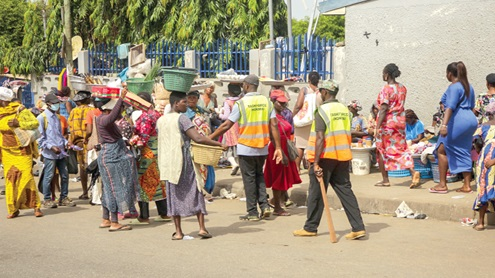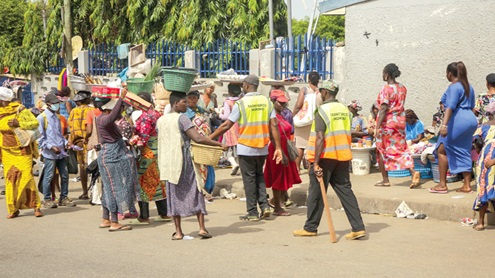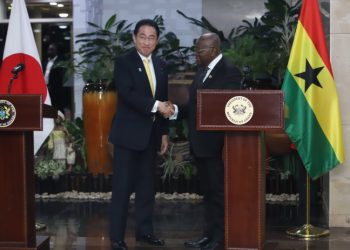
Introduction
In the bustling and rapidly transforming urban landscapes of Ghana, especially in major city centres like Accra and Kumasi, the heartbeat of economic resilience can be found not just in skyscrapers or shopping malls, but on the pavements, sidewalks, roundabouts, and traffic intersections. Here, street vendors and hawkers form a vibrant, dynamic, and often overlooked urban tapestry, one that is as resilient as it is essential.
These enterprising individuals, predominantly women and the youth, populate the informal sector with remarkable tenacity, braving harsh weather, regulatory crackdowns, and infrastructural limitations to earn a living. Their stalls, carts, and baskets may seem ordinary to the untrained eye, but they tell a deeper story: one of survival, creativity, informal innovation, and the right to urban space.
To some observers, street vending presents an urban management dilemma associated with congestion, sanitation concerns, and bylaw violations. Yet, to the vendors themselves and to countless families who rely on the daily income it provides, this informal economy represents more than commerce. It is an ecosystem of livelihoods, a platform for socio-economic mobility, and a silent but powerful force that underpins urban survival in cities where formal employment opportunities remain insufficient.
As a Spatial Planner and Planning Officer within the Ministry of Local Government, I am compelled to advocate for a paradigm shift in how we understand and respond to this reality. Informality is not an aberration of urban order; it is, in fact, the organic response of citizens navigating economic exclusion and institutional gaps. Rather than being treated as a nuisance or impediment to modernisation, street vending must be acknowledged as a legitimate, evolving component of the urban economy. It offers a critical lens through which we can evaluate our planning frameworks, regulatory structures, and developmental priorities.
To relegate these economic actors to the periphery of urban planning is to ignore the very soul of our cities. It is time we adopt a more generous, informed, and place-based approach one that reframes informality not as a problem to be eradicated, but as an opportunity to co-create inclusive cities that reflect the realities of all who inhabit them. This is the call to action: to reimagine our urban futures with the informal sector at the centre of planning discourse, innovation, and transformation.
What do the Laws and Policies Say?
The regulation and governance of urban informality in Ghana, particularly the phenomenon of street vending and hawking, are grounded within a broader legal and policy framework that, while often fragmented in implementation, provides a foundation for inclusive urban development.
At the heart of this framework lies the Local Governance Act, 2016 (Act 936), which mandates all 261 Metropolitan, Municipal, and District Assemblies (MMDAs) with the responsibility to ensure order, safety, and sanitation in their jurisdictions. Yet, this same Act goes beyond mere enforcement duties; it also entrusts local authorities with the critical mandate to promote equitable development that responds to the needs of all segments of the urban population, including those operating outside the formal economic grid.
Complementing this is the Draft Final National Urban Policy Framework, Ghana’s flagship policy on urban development. The policy makes a conscious shift from conventional urban planning approaches by recognising the informal economy not as a marginal entity, but as a significant and enduring component of Ghana’s urban landscape. It articulates the necessity of building cities that are inclusive, safe, resilient, and sustainable, principles that align closely with the United Nations’ Sustainable Development Goal 11. Notably, the policy emphasises the need to integrate the informal sector into broader urban strategies, acknowledging that informality, in its many forms, is not merely a symptom of underdevelopment but a structural reality that requires targeted policy responses.
While less direct, the Streetism Policy Framework, which primarily focuses on safeguarding vulnerable children living and working on the streets, also touches on the broader socio-economic conditions that give rise to street-based livelihoods. Many of these children are embedded in informal economies either as helpers to hawkers or through their own small-scale selling activities. Thus, policies targeting street children inadvertently intersect with the larger dynamics of urban informality and survival strategies. The lessons here are significant: if the street serves both as a marketplace and a makeshift home for the urban poor, then our response must go beyond enforcement and delve into structural solutions that foster dignity and opportunity.
Together, these legal instruments and policy documents illustrate that Ghana possesses a normative basis for embracing a more inclusive urban planning philosophy. However, the critical challenge lies not in the absence of policy, but in the operational will and creativity required to translate policy ideals into localised, actionable urban solutions. This is the policy and planning juncture at which street vendors and hawkers must be consciously included, not as afterthoughts, but as co-architects of our urban futures.
What Other African Cities Are Doing:
Across the African continent, cities grappling with the complex dynamics of informality have begun to adopt progressive and context-sensitive strategies that recognise the informal economy not as a nuisance, but as a powerful force for urban inclusion, resilience, and economic vibrancy.
In Kigali, Rwanda, a city often lauded for its orderliness and rapid urban transformation, local authorities have pioneered an initiative that integrates street vendors into the formal urban economy by establishing designated vending zones equipped with standardised kiosks, vendor identification cards, and uniforms. This approach has not only helped regulate informal commerce but has also enhanced safety, cleanliness, and accountability, without stripping traders of their livelihoods.
In South Africa, the city of Durban provides a more participatory and socially rooted example through the Warwick Junction Urban Renewal Project. Here, urban planners, architects, and municipal authorities collaborated directly with local street traders to reimagine one of the busiest market intersections in the city. Instead of displacing vendors, the project focused on redesigning and upgrading trading spaces, offering improved infrastructure such as weather-protected stalls, sanitation facilities, and waste disposal systems, while preserving the organic economic activity that had flourished in the area for decades. This model stands as a testament to the power of inclusive planning and the importance of engaging stakeholders as co-creators in urban design.
Similarly, in Nairobi, Kenya, where rapid urbanisation has placed immense pressure on public infrastructure, transport authorities have creatively integrated informal trading into the design of the city’s Bus Rapid Transit (BRT) system. Recognising the inevitability of informal vending in and around transport corridors, planners designated specific vending zones with clearly defined access schedules, allowing hawkers to operate during off-peak hours. This innovative model reduces conflicts between pedestrians, traders, and commuters while preserving the economic opportunities that such spaces naturally generate.
These African experiences underscore a profound lesson: informality is not inherently at odds with regulation. Rather, when governments adopt an empathetic, consultative, and context-driven approach, regulation can coexist harmoniously with support, yielding safer, cleaner, and more economically inclusive cities.
Towards a Localised Ghanaian Model
Towards the development of an inclusive and sustainable urban future, Ghana stands at a critical juncture where the old model of punitive enforcement of street vending must give way to a more empathetic, pragmatic, and co-creative approach. The realities on the ground, especially in cities like Accra, Kumasi, and Tamale, point to the fact that street vendors are not anomalies to be cleared off the pavements, but citizens with agency, resilience, and legitimate economic contributions that urban planning must accommodate rather than displace.
First and foremost, urban authorities should consider the establishment of designated vending zones within strategic commercial and transportation nodes. These zones, thoughtfully integrated into the broader city plan, would be outfitted with essential amenities, waste management systems, potable water, shaded structures, public lighting, and rest areas. By offering secure and organised environments, city authorities can ensure both order and dignity for vendors while enhancing the aesthetics and functionality of urban spaces.
Secondly, the success of any planning intervention rests upon the principle of participatory urban governance. It is imperative that informal workers and their associations are actively engaged in the decision-making processes that affect their daily lives. When vendors are consulted in planning committees and policy formulation, their unique insights contribute to crafting more grounded and effective solutions. Such an inclusive approach not only builds trust but ensures that regulations are more likely to be adhered to because they emerge from dialogue rather than imposition.
Moreover, the concept of time-sharing urban spaces has already been successfully tried in cities like Nairobi holds significant potential for Ghana. City authorities could designate specific urban corridors, particularly in high-footfall areas, for vending during off-peak hours. This flexible use of space helps decongest critical pedestrian walkways and vehicular routes during the busiest times, while still preserving economic opportunities for hawkers and small-scale traders.
In addition to physical and regulatory interventions, there is a pressing need to invest in the capacity building and financial empowerment of street vendors. Initiatives such as training workshops on hygiene, product presentation, customer service, and financial literacy should be institutionalised across municipalities. These efforts could be coupled with increased access to microcredit through state initiatives like the Microfinance and Small Loans Centre (MASLOC) or the National Entrepreneurship and Innovation Programme (NEIP), enabling traders to grow and formalise their businesses progressively.
Finally, Ghana must embrace the transformative power of digital inclusion in informal commerce. With mobile money already widespread, vendors can be encouraged and supported to adopt digital payment platforms. This reduces the risks associated with cash transactions, enhances transaction transparency, and positions informal traders to engage more fluidly with formal financial institutions. Partnerships with fintech firms and municipal IT departments can help in rolling out training, platforms, and support systems tailored for this group.
Conclusion: From Obstruction to Inclusion
The phenomenon of street vending in Ghana must be reimagined not as an impediment to urban progress but as an indispensable part of the nation’s social and economic fabric. Far from being a nuisance, street vending represents a lifeline for thousands of households supporting families, fuelling local economies, and injecting vitality into urban life. These informal actors are not just surviving in the city; they are shaping it, enriching it with their presence, goods, and entrepreneurial ingenuity.
To treat informality as synonymous with illegality is to fundamentally misread the role it plays in urban development. Informality is, in truth, a parallel economic ecosystem dynamic, adaptive, and rooted in the lived realities of the people. It is an organic response to the rigidities and exclusions of the formal sector, and as such, demands recognition, accommodation, and strategic integration. The informal economy is not beneath the radar of governance; it is a frontier where innovation and inclusion must meet.
Ghana stands to benefit immensely by reframing how we manage and plan for this sector. Through thoughtful, localised planning grounded in cultural context, economic reality, and participatory principles, we can turn what many view as disorder into a catalyst for urban transformation. Our cities can draw powerful lessons from sister cities across the African continent, where progressive models of inclusion like designated vending zones, participatory planning processes, and time-shared spaces have successfully balanced regulation with opportunity.
As the pressures of urbanization intensify, the challenge before us is not to eliminate street vending, but to channel its potential constructively. This is the moment for city authorities, urban planners, development practitioners, and policymakers to show bold leadership. It is time to shift from punitive enforcement to co-creation, from marginalisation to empowerment, and from reaction to anticipation.
In embracing street vendors as integral actors in the urban space, we uphold the dignity of labour, honour the entrepreneurial spirit of Ghanaian citizens, and lay the foundation for cities that are not only economically vibrant but also socially just. This is not just a matter of planning; it is a matter of principle, equity, and shared vision. By transforming our mindset from obstruction to inclusion, we can build a future where Ghana’s urban centres are places of opportunity for all, formal and informal alike.
–
Dennis Akemdaga Amoah
Spatial Planner
0248270145
DISCLAIMER: The Views, Comments, Opinions, Contributions and Statements made by Readers and Contributors on this platform do not necessarily represent the views or policy of Multimedia Group Limited.
DISCLAIMER: The Views, Comments, Opinions, Contributions and Statements made by Readers and Contributors on this platform do not necessarily represent the views or policy of Multimedia Group Limited.
- President Commissions 36.5 Million Dollars Hospital In The Tain District
- You Will Not Go Free For Killing An Hard Working MP – Akufo-Addo To MP’s Killer
- I Will Lead You To Victory – Ato Forson Assures NDC Supporters
Visit Our Social Media for More




